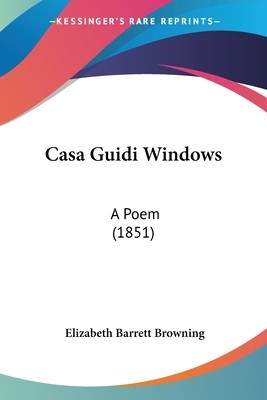
- We will send in 10–14 business days.
- Author: Elizabeth Barrett Browning
- Publisher: Kessinger Publishing
- ISBN-10: 1436798019
- ISBN-13: 9781436798013
- Format: 15.2 x 22.9 x 1 cm, minkšti viršeliai
- Language: English
- SAVE -10% with code: EXTRA
Reviews
Description
In 1847, Elizabeth Barrett Browning moved with her new husband to an apartment in Florence, in the wake of perhaps the most famous literary courtship of the nineteenth century. She soon took to calling their home the Casa Guidi. From there, she observed the events of the early Risorgimento. It was at this time that she produced some of her finest work, including Aurora Leigh and Casa Guidi Windows. An impressionistic and thoroughly atypical landmark in the Romantic canon, the latter was written in two parts, separated by several years. Beginning with the memory of a singing child and a lush description of Florence's beauty, the first part explores the air of optimism that permeates both the city and the narrator. By the second, disillusionment is rife: Florence has become the scene of demonstrations and broken political promises.
Excerpt:
This Poem contains the impressions of the writer upon events in Tuscany of witch she was a witness. "From a window," the critic may demur. She bows to the objection in the very title of her work. No continuous narrative, nor exposition of political philosophy, is attempted by her.
EXTRA 10 % discount with code: EXTRA
The promotion ends in 21d.22:23:53
The discount code is valid when purchasing from 10 €. Discounts do not stack.
- Author: Elizabeth Barrett Browning
- Publisher: Kessinger Publishing
- ISBN-10: 1436798019
- ISBN-13: 9781436798013
- Format: 15.2 x 22.9 x 1 cm, minkšti viršeliai
- Language: English English
In 1847, Elizabeth Barrett Browning moved with her new husband to an apartment in Florence, in the wake of perhaps the most famous literary courtship of the nineteenth century. She soon took to calling their home the Casa Guidi. From there, she observed the events of the early Risorgimento. It was at this time that she produced some of her finest work, including Aurora Leigh and Casa Guidi Windows. An impressionistic and thoroughly atypical landmark in the Romantic canon, the latter was written in two parts, separated by several years. Beginning with the memory of a singing child and a lush description of Florence's beauty, the first part explores the air of optimism that permeates both the city and the narrator. By the second, disillusionment is rife: Florence has become the scene of demonstrations and broken political promises.
Excerpt:
This Poem contains the impressions of the writer upon events in Tuscany of witch she was a witness. "From a window," the critic may demur. She bows to the objection in the very title of her work. No continuous narrative, nor exposition of political philosophy, is attempted by her.


Reviews